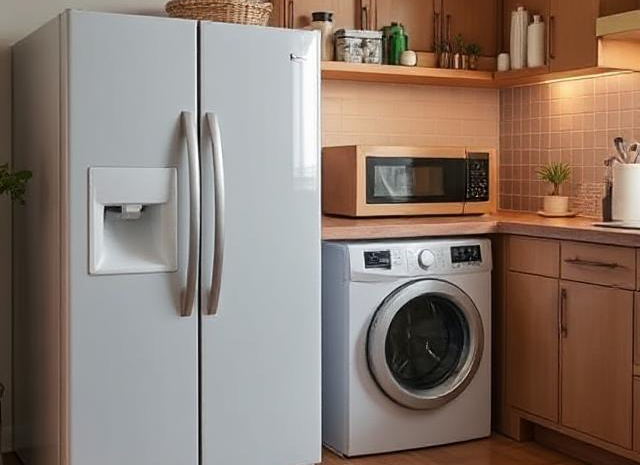
Does Home Insurance Cover Appliance Repairs And Replacements?
Homeowners insurance generally does not cover appliance repairs or replacements unless the damage is caused by a covered peril. Here’s a detailed look at how homeowners insurance treats appliances and when, if ever, repairs or replacements might be covered:
1. When Appliances Are Covered by Home Insurance
Homeowners insurance policies typically cover damage caused by certain perils, but not general wear and tear or mechanical breakdowns. Here’s when appliances might be covered:
a) Damage from Covered Perils
Home insurance may cover appliance repairs or replacements if the appliances are damaged by a covered peril. Common covered perils include:
- Fire: If a fire damages your refrigerator, washing machine, or dishwasher, your homeowners insurance might cover the cost to repair or replace the appliance.
- Vandalism or Theft: If your home is burglarized and your appliances are stolen or damaged, your insurance may help replace them, depending on your policy.
- Lightning Strikes or Power Surges: If lightning strikes and causes a power surge that damages your appliances (such as microwaves, refrigerators, or dishwashers), your insurance may cover the repair or replacement costs.
- Water Damage (Not from Flooding): If a burst pipe or accidental water leak damages an appliance (like a washing machine or refrigerator), the damage could be covered under your home insurance policy, assuming the cause was accidental and not due to negligence.
b) Electrical or Plumbing Failures
If an electrical or plumbing issue (like a burst pipe or a short circuit) causes damage to an appliance, it might be covered under your insurance, as long as the issue is not due to lack of maintenance or wear and tear.
2. When Appliances Are Not Covered
While your homeowners insurance may cover appliance damage in certain cases, there are several situations where appliances are not covered:
a) General Wear and Tear
Homeowners insurance does not cover damage or malfunction caused by normal wear and tear. For example, if your refrigerator stops working because it’s old and has simply worn out, this would not be covered by your insurance policy. Home insurance is designed to protect against sudden, accidental damages, not the gradual decline of an appliance over time.
b) Mechanical Breakdown
Damage from mechanical failure or breakdown is typically not covered. If your oven or washing machine stops working due to internal mechanical issues or failure, this wouldn’t be covered under your standard homeowners insurance policy.
c) Flooding or Sewer Backup
Most home insurance policies exclude damage caused by floods or sewer backups. If an appliance is damaged due to flooding or a sewer backup, the damage would likely not be covered unless you have separate flood insurance or a sewer backup rider added to your policy.
d) Maintenance-Related Issues
Appliances that break due to neglect or improper maintenance are typically not covered. If an appliance stops working because it was not maintained properly (such as failing to clean filters or not servicing the appliance as recommended by the manufacturer), your insurer would likely not cover the repair costs.
3. Home Warranty vs. Home Insurance
It’s also important to distinguish between home insurance and a home warranty:
- Homeowners Insurance: Covers damage caused by covered perils such as fire, theft, or storm damage. It’s designed to protect your home and belongings from unexpected, catastrophic events.
- Home Warranty: A home warranty is a separate service contract that covers repairs or replacements of major home appliances and systems (such as HVAC, plumbing, and electrical systems) when they break down due to normal wear and tear. A home warranty can help you avoid repair costs for appliances, but it’s different from homeowners insurance.
If you are concerned about appliance breakdowns, consider getting a home warranty in addition to your homeowners insurance. A home warranty can cover the cost of repairing or replacing home appliances that fail due to normal usage or aging.
4. How to Ensure Appliance Protection
While homeowners insurance doesn’t typically cover appliances unless damaged by a covered peril, here are some things you can do to protect your appliances:
- Regular Maintenance: Keep your appliances in good condition by following the manufacturer’s maintenance guidelines. This can help prevent breakdowns and extend the lifespan of your appliances.
- Consider a Home Warranty: If you want more comprehensive coverage for appliance breakdowns, a home warranty might be a good option. Home warranties often cover repairs or replacements of major home appliances, including refrigerators, dishwashers, and washers/dryers.
- Add Coverage for Equipment Breakdown: Some homeowners insurance policies offer optional add-ons for coverage of home systems and appliances that fail due to mechanical breakdowns or other causes. Check with your insurer to see if this option is available and whether it makes sense for your needs.

